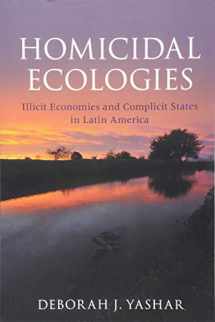
Homicidal Ecologies: Illicit Economies and Complicit States in Latin America (Cambridge Studies in Comparative Politics)
Book details
Summary
Description
Why has violence spiked in Latin America's contemporary democracies? What explains its temporal and spatial variation? Analyzing the region's uneven homicide levels, this book maps out a theoretical agenda focusing on three intersecting factors: the changing geography of transnational illicit political economies; the varied capacity and complicity of state institutions tasked with providing law and order; and organizational competition to control illicit territorial enclaves. These three factors inform the emergence of 'homicidal ecologies' (subnational regions most susceptible to violence) in Latin America. After focusing on the contemporary causes of homicidal violence, the book analyzes the comparative historical origins of weak and complicit public security forces and the rare moments in which successful institutional reform takes place. Regional trends in Latin America are evaluated, followed by original case studies of Central America, which claims among the highest homicide rates in the world.


We would LOVE it if you could help us and other readers by reviewing the book
Book review



